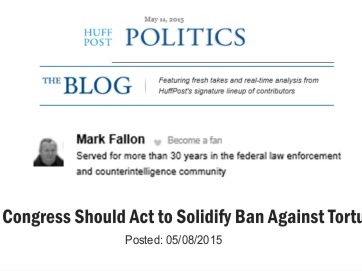Conflicting Interrogation Techniques
Witness to Guantanamo release a video of an interview of Mark discussing how the manner in which military interrogations were being conducted were in direct conflict with the techniques used by the FBI, CITF and other federal law enforcement and counterintelligence agencies.
Congress Should Act to Solidify Ban Against Torture
At this point we all know that, in President Obama’s words, “We tortured some folks.” The Senate Select Committee on Intelligence’s report on the CIA’s rendition, detention, and interrogation program revealed shocking abuses that went far beyond even the torture that the administration had authorized. The Senate report represents a victory for transparency.
But the story doesn’t end there. The government went to great lengths to cover for its official policy of abuse, and some of that is just now coming to light.
Just last week a group of dissident health professionals and human rights activists issued a report that contends that the American Psychological Association (APA) secretly collaborated with the CIA “to bolster a legal and ethical justification for the torture of prisoners swept up on the post-Sept. 11 war on terror.”
After the 9/11 attacks I was appointed the Special Agent in Charge of the Department of Defense task force to investigate terrorists for military commission trials. In 2002, I became aware of cruel treatment of detainees, and I witnessed heroic, moral leaders who took a stand against torture–interrogators, law enforcement professionals, lawyers, and yes, psychologists. Unfortunately our warnings weren’t heeded, and the administration continued its policy of brutality.
I want to make sure America is never in the same situation again, so for the last six years I’ve served on the High Value Detainee Interrogation Group (HIG) Research Committee, currently as chair of the committee. Composed of research scientists, government experts, psychologists, journalists, and human rights advocates, the HIG research committee studies the most effective means to lawfully and humanely obtain accurate and reliable national security information from high value targets.
Had the HIG existed in 2001, policy makers would undoubtedly have resisted turning to the dark side. They would have known that not only are abusive interrogation techniques wrong; they’re also ineffective. They would have known the thoroughly researched scientific backing for that conclusion. And they would have known what humane and legal techniques actually work.
The report on the APA sheds light on the fact that unless we as a nation close the loopholes that allowed torture to take place, proponents will continue to use any rationale to justify the practice. The attorney general or Congress should appoint an independent counsel to investigate if there was an intentional manipulation of the APA to give the CIA the legal cover for torture. An independent counsel would avoid the conflict of interest inherent when the government investigates itself and would have the ability to delve into the conspiracy of torture and the cover-up of torture related offenses.
At the same time, to make sure the United States never again sanctions torture, we need legislation. Next week the Senate Armed Services Committee will markup with 2016 National Defense Authorization Act. It should take this opportunity to ensure that all U.S. officials–including the CIA and the intelligence community–abide by humane interrogation standards.
Senator John McCain reminded us who we are as a nation when he took the Senate floor on the day the torture report was released. He said, “The truth is sometimes a hard pill to swallow….but the American people are entitled to it, nonetheless….We need only remember in the worst of times, through the chaos and terror of war, when facing cruelty, suffering and loss, that we are always Americans, and different, stronger, and better than those who would destroy us.”
America isn’t great because we never make mistakes–far from it. It’s our ability to admit our mistakes and to recover from them that determines our greatness. The Senate report was a step in that direction, but we need to solidify the ban against torture to truly emerge from the dark side and stand in the light.
Follow Mark Fallon on Twitter: www.twitter.com/glynco
Former Bush Official With Ties to CIA Torture Program Now Advised Obama Interrogators
Huffington Post reporter Ali Watkins interview Mark for an article on the High Value Detainee Interrogation Group (HIG) and information released in a report titled “All The President’s Psychologists.”
Interrogations Advisor Urges Bush-era Torture Probe
Reuters reporter Allstair Bell interviewed Mark who called for an independent counsel, with subpoena power to fully investigate the role of psychologists collaborating to justify torture.
Reed College – Panel Discussion: Questioning High Value Suspects – Confronting Torture and Advancing Effective Interrogation
Reed College Public Policy Lecture Series hosted a panel discussion on Questioning High-Value Suspects: Confronting Torture and Advancing Effective Interrogation. Joshua Philips moderated the panel with Dr. Christian Meissner, Colonel Steven Kleinman, USAF-retired and Mark.
Panel: Questioning High-Value Suspects – Confronting Torture and Advancing Effective Interrogation
Reed College Public Policy Lecture Series announced a panel discussion moderated by Joshua Phillips, with Dr. Christian Meissner, Colonel Steven Kleinman, USAF-retired and Mark to discuss questioning high-value targets.
